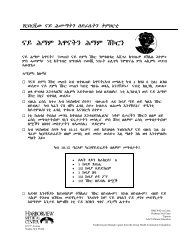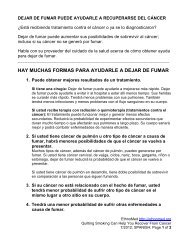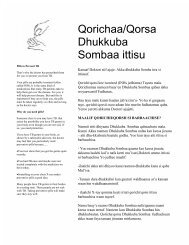Somali Knowledge Attitude Practices Study (KAPS) - EthnoMed
Somali Knowledge Attitude Practices Study (KAPS) - EthnoMed
Somali Knowledge Attitude Practices Study (KAPS) - EthnoMed
Create successful ePaper yourself
Turn your PDF publications into a flip-book with our unique Google optimized e-Paper software.
In the riverine community, consumption of beans, meat, vegetables and eggs are encouraged to<br />
help build blood and prevent anaemia during pregnancy. Consumption of fat (ghee) and mutton<br />
as well as honey during the first 2-3 months of pregnancy is however discouraged because the<br />
foods are believed to cause abortion. Fats/ghee, particularly from sheep, potatoes, and fresh cow<br />
milk should be avoided as they are believed to make the baby to grow too big, hence difficult<br />
delivery. According to some women in Hiran, consumption of too much salt and hot pepper is<br />
also not advisable due to their low nutritional value and the belief that they cause anaemia in<br />
pregnant women.<br />
In the urban livelihood zones of South and Central <strong>Somali</strong>a, chicken, eggs, milk powder,<br />
vegetables and meat are considered healthy foods for a pregnant mother as seen in Table 1.<br />
Women should however eat these foods in moderation to avoid having big babies during delivery.<br />
Table 1: Foods Consumed and Prohibited during Pregnancy by Livelihood Zones<br />
Livelihood Food Items Allowed for<br />
Zone<br />
Consumption<br />
Pastoral Sour Milk, rice, Sorghum.<br />
Meat and fresh milk are only<br />
allowed in moderation<br />
Agro-pastoral Sour milk, meat, fruits,<br />
vegetables, soor, sour milk<br />
Riverine Meat, Eggs, Beans,<br />
Vegetables<br />
Urban Chicken, meat, vegetables<br />
and milk<br />
19<br />
Food Items Prohibited<br />
Fresh milk, vegetables, fruits, mutton, liver,<br />
meat from camel’s hump or plenty of meat to<br />
avoid birth complications due to big babies.<br />
Fresh camel’s milk, eggs, liver. Honey, camel<br />
hump and fat and mutton and are believed to<br />
cause abortion or bleeding.<br />
Fat (ghee) and meat from ram and honey<br />
during the first 2-3 months of pregnancy.<br />
These foods are believed to cause abortion<br />
Although protein foods of chicken, meat and<br />
milk are encouraged, they should be eaten in<br />
moderation.<br />
Post-natal Dietary <strong>Practices</strong><br />
Among the pastoralists, a mother traditionally received post-natal care from her mother for a<br />
period of 40 days after delivery. During the 40 days period, traditionally known as Umol Bah, a<br />
goat or sheep was slaughtered and the meat dried and kept for her to eat. Her mother also<br />
prepared and encouraged her to drink porridge enriched with milk, a lot of tea with milk, and eat<br />
honey, liver and kidney, head of goat, nutritious soup and sesame oil. The special diet was<br />
expected to help replace the blood lost during delivery and aid in quick recovery for the mother.<br />
Due to war and disintegration of the traditional family networks, the Umol Bah period has<br />
reduced to 7-10 days and lactating mothers are encouraged to feed on whatever food is prepared<br />
for the rest of the family.<br />
The agro-pastoralists encourage women, after delivery, to eat food from family pot but with extra<br />
meat, porridge and soup. Among the riverine community, after delivery, a woman is encouraged<br />
to drink enriched porridge with oil, milks, butter, and mutton for nourishment. Consumption of<br />
fish during the 1 st month after delivery is discouraged in the riverine as it is associated with poor<br />
maternal health.<br />
In urban areas, after delivery, the woman’s mother or any close relative was traditionally<br />
expected to stay with her for one month or 40 days (Umol Bah) to ensure that she feeds well and






